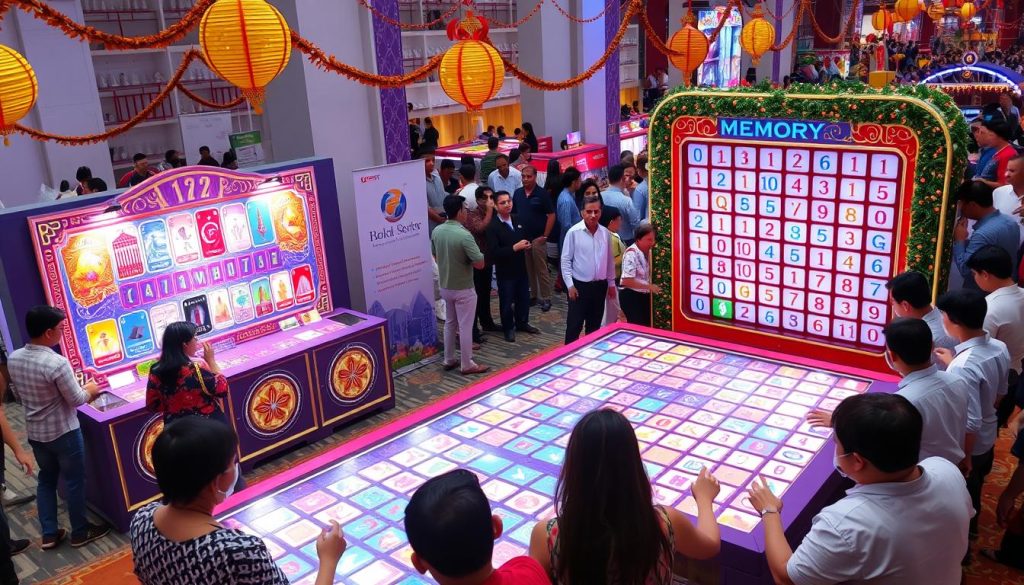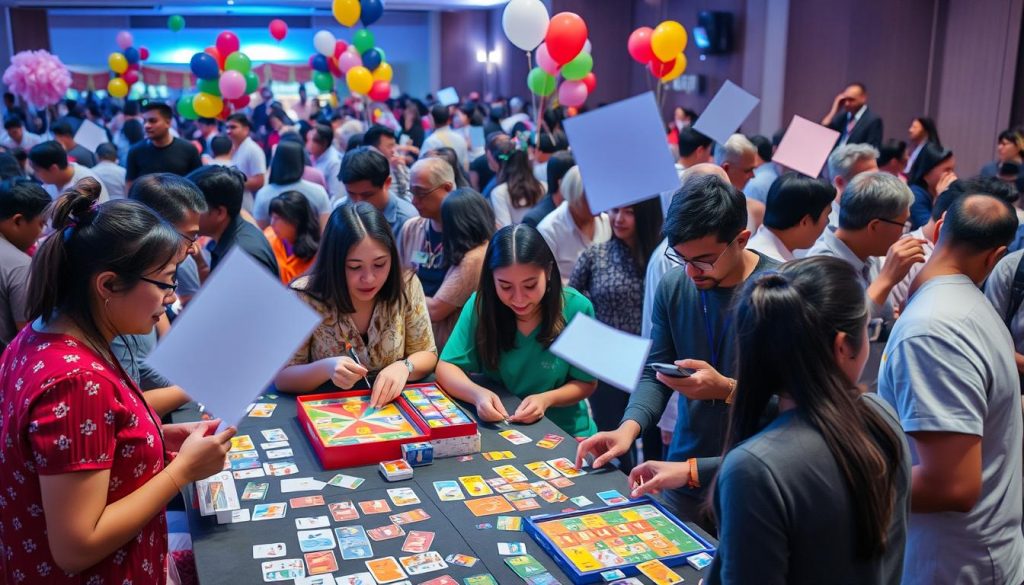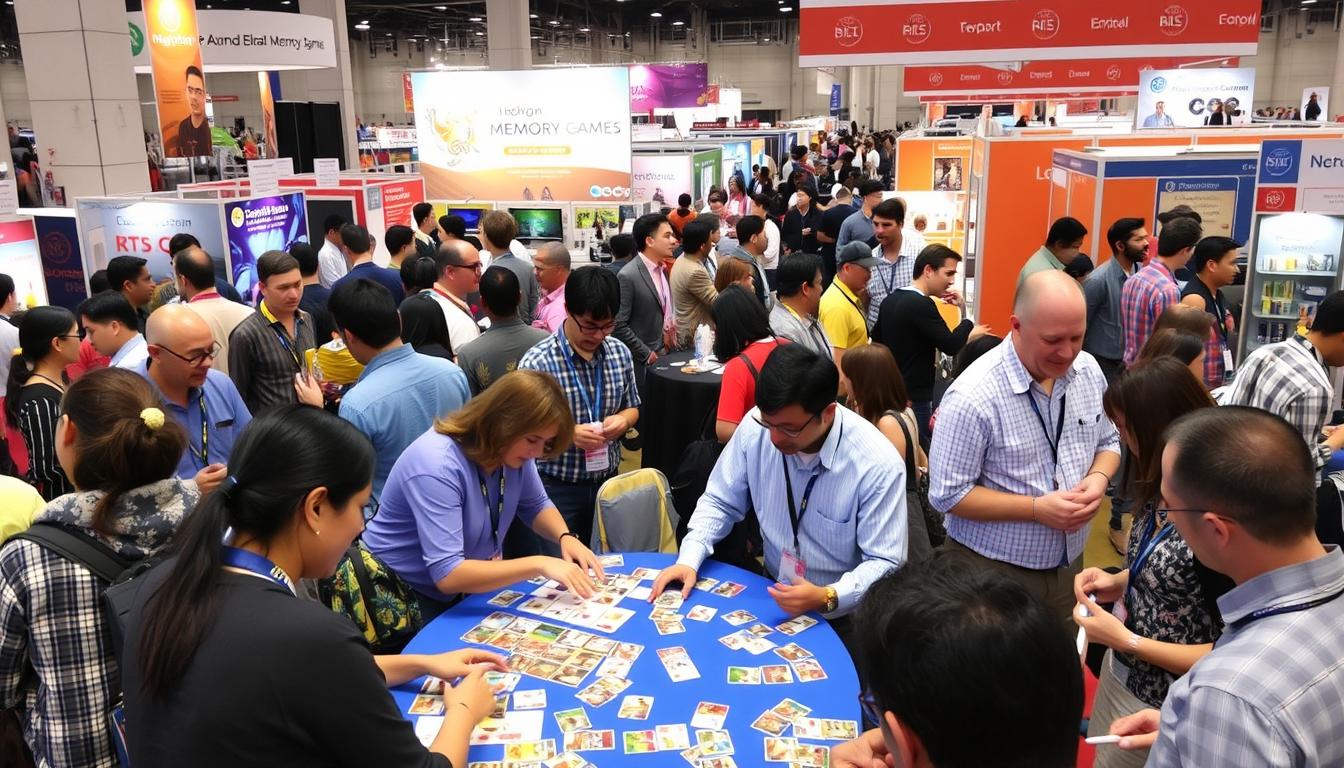Trade shows and corporate events are getting a fun makeover with memory games. These engaging activities are becoming a hit, transforming how companies interact with attendees. By tapping into the power of play, businesses are finding new ways to stand out in crowded event spaces.
Memory games at trade events are more than just fun diversions. They’re smart tools for interactive marketing that stick in people’s minds long after the event ends. From simple card matches to high-tech digital challenges, these games are changing how brands connect with potential clients and partners.
By blending entertainment with business goals, companies are seeing better results. Attendees are more likely to remember a brand after playing a game than just picking up a brochure. This fresh approach is making waves in event marketing, proving that learning and fun can go hand in hand.
Key Takeaways
- Memory games enhance engagement at trade events
- Interactive marketing through games boosts brand recall
- Games range from simple to high-tech digital experiences
- Playful activities lead to better business connections
- Fun and learning combine for effective marketing strategies
Understanding Memory Games in Event Marketing
Memory games are powerful tools in event marketing, blending fun with brand promotion. These interactive experiences engage participants, boost brand recall, and drive lead generation. Let’s explore the core concepts and psychology behind these games, and their impact on event success.
Definition and Core Concepts
Memory games in event marketing are interactive activities that challenge participants to recall information, often related to a brand or product. These games leverage experiential marketing techniques to create memorable encounters that stick with attendees long after the event ends.
Psychology Behind Memory Games
The effectiveness of memory games stems from cognitive psychology principles. By engaging multiple senses and encouraging active participation, these games create stronger neural connections, enhancing information retention and recall.
Impact on Participant Engagement
Memory games significantly boost participant engagement at events. They create a fun, competitive atmosphere that draws attendees in and keeps them involved. This increased engagement translates to better brand recognition and more qualified leads.
| Engagement Metric | Without Memory Games | With Memory Games |
|---|---|---|
| Average Time Spent at Booth | 2 minutes | 8 minutes |
| Lead Conversion Rate | 15% | 35% |
| Brand Recall After 1 Week | 30% | 70% |
By incorporating memory games into event strategies, marketers can create lasting impressions, drive brand recall, and boost lead generation efforts. These engaging activities transform passive attendees into active participants, fostering deeper connections with brands and products.
Why Memory Games Are a Hit at Trade Events
Trade events buzz with energy, and memory games stand out as crowd-pleasers. These interactive challenges create a fun atmosphere while serving important business goals. Attendees flock to booths featuring memory games, drawn by the promise of engagement and prizes.
Memory games excel at fostering networking opportunities. As participants compete, they naturally strike up conversations with fellow players. This casual interaction often leads to meaningful business connections. The shared experience of playing creates an instant bond, breaking down barriers between strangers.
Brand awareness soars through well-designed memory games. Companies can incorporate their logos, products, or key messages into game elements. Every time a player flips a card or solves a puzzle, they’re exposed to the brand. This repeated exposure cements the company’s image in attendees’ minds.
The memorable experiences created by these games leave a lasting impression. Long after the event ends, participants recall the fun they had playing. This positive association extends to the hosting company, keeping them top-of-mind for future business opportunities.
“Our memory game booth saw triple the foot traffic compared to previous years. It was a game-changer for our lead generation efforts.” – Sarah Chen, Marketing Director
Memory games also provide valuable data for exhibitors. By tracking participation rates and scores, companies gain insights into attendee interests and engagement levels. This information proves invaluable for follow-up strategies and future event planning.
Benefits of Implementing Memory Games at Corporate Events
Memory games at corporate events offer more than just fun. They serve as powerful tools for interactive marketing, fostering connections and driving business growth. Let’s explore the key advantages of incorporating these games into your next event.
Enhanced Networking Opportunities
Memory games break the ice, encouraging attendees to interact in a relaxed setting. This natural engagement leads to meaningful conversations and stronger professional relationships. Participants bond over shared experiences, creating a foundation for future collaborations.
Increased Brand Retention
By integrating company information into memory games, you boost brand recall among participants. This playful approach to learning about your products or services makes a lasting impression. Automated SMS marketing can reinforce these memories post-event, keeping your brand top-of-mind.
Lead Generation Success
Memory games excel at capturing attendee information, making them valuable lead generation tools. By offering incentives for participation, you can collect data while providing an enjoyable experience. This approach yields high-quality leads more likely to convert into customers.
| Benefit | Impact | Success Metric |
|---|---|---|
| Networking | Increased connections | 30% more business cards exchanged |
| Brand Retention | Improved recall | 25% higher brand recognition |
| Lead Generation | Quality leads | 40% increase in conversion rates |
Implementing memory games at corporate events transforms passive attendees into engaged participants. This interactive approach not only enhances the event experience but also drives tangible business results through improved networking, brand retention, and lead generation.
Popular Memory Game Formats for Events
Memory games have become a cornerstone of interactive marketing at events. These engaging activities captivate attendees and create lasting brand impressions. Let’s explore some popular formats that make waves in the world of experiential marketing.

Digital matching games lead the pack. Participants tap screens to pair logos, products, or brand messages. This format blends technology with cognitive challenge, perfect for tech-savvy audiences.
Physical card games remain a classic choice. Oversized cards with brand imagery spread across tables invite group play. This tactile experience fosters networking and teamwork among event-goers.
Augmented reality scavenger hunts merge digital and physical realms. Attendees use smartphones to find and remember virtual objects placed around the venue. This high-tech twist on memory games creates a buzz-worthy experience.
“Memory games at events are not just fun; they’re powerful tools for brand retention and lead generation.” – Marketing Expert
Let’s compare these popular memory game formats:
| Format | Engagement Level | Tech Requirement | Group Play |
|---|---|---|---|
| Digital Matching | High | Moderate | Individual |
| Physical Cards | Moderate | Low | Group |
| AR Scavenger Hunt | Very High | High | Both |
These game formats offer versatile options for event marketers. By choosing the right memory game, brands can create unforgettable experiences that resonate long after the event ends.
Digital vs Traditional Memory Games at Events
Memory games at events have evolved, offering diverse options for interactive marketing. Event planners now choose between digital and traditional approaches to create memorable experiences and boost brand awareness.
Technology-Based Solutions
Digital memory games leverage cutting-edge technology to engage participants. These games often use touchscreens, mobile apps, or augmented reality. They offer real-time tracking, personalized experiences, and easy data collection for lead generation.
Classic Memory Game Approaches
Traditional memory games rely on physical elements like cards, boards, or objects. These tactile experiences create a nostalgic feel and encourage face-to-face interactions. They’re simple to set up and don’t require technical expertise.
Hybrid Implementation Strategies
Combining digital and traditional elements offers the best of both worlds. For example, a physical memory game could use QR codes to unlock digital content. This approach enhances engagement while maintaining the charm of classic games.
| Game Type | Pros | Cons |
|---|---|---|
| Digital | Easy data collection, scalable | Requires tech setup |
| Traditional | Tactile experience, simple setup | Limited data insights |
| Hybrid | Versatile, combines benefits | May be complex to design |
Choosing the right approach depends on your event goals, audience, and resources. Effective marketing strategies often blend various game types to maximize engagement and create lasting brand impressions.
Designing Custom Memory Games for Brand Integration
Creating custom memory games for brand integration is a powerful strategy in experiential marketing. These games offer a unique opportunity to boost brand recall while engaging participants in interactive marketing experiences. By designing games that seamlessly incorporate brand elements, companies can create lasting impressions on their target audience.
When crafting custom memory games, consider these key aspects:
- Align game mechanics with brand values
- Incorporate brand colors, logos, and slogans
- Tailor difficulty levels to your audience
- Ensure the game reflects your marketing objectives
A well-designed memory game can significantly enhance brand visibility and recognition. For instance, a company specializing in contact management solutions could create a game where players match client profiles to appropriate services, reinforcing their brand’s expertise in customer relationship management.
“Custom memory games are not just about fun; they’re strategic tools for embedding your brand in the minds of potential clients.”
To maximize the impact of your custom memory game, consider integrating digital elements. This approach can provide valuable data on player engagement and preferences, allowing you to refine your marketing strategies further. Remember, the goal is to create an enjoyable experience that subtly yet effectively promotes your brand.
Measuring Success: KPIs for Event Memory Games
Evaluating the impact of memory games at events is crucial for refining marketing strategies. Let’s explore key metrics that help gauge the effectiveness of these interactive experiences in driving brand awareness and lead generation.
Engagement Metrics
Track participation rates and time spent on memory games to measure attendee interest. High engagement often correlates with increased brand recall. Monitor social media mentions and shares related to your event games to assess their viral potential.
Lead Quality Assessment
Analyze the quality of leads generated through memory games. Compare conversion rates of game participants to other lead generation methods. Look at factors like job titles, company sizes, and expressed interest levels to determine lead value.
ROI Calculation Methods
Calculate return on investment by comparing game costs to the value of new business gained. Consider long-term benefits like enhanced networking opportunities and improved brand perception. Use this formula:
| ROI Calculation | Formula |
|---|---|
| Event Memory Game ROI | (Value of Leads – Game Costs) / Game Costs x 100 |
By focusing on these KPIs, you can fine-tune your memory game strategy to maximize its impact on lead generation and brand awareness at future events.
Best Practices for Memory Game Implementation

Implementing memory games at events requires careful planning and execution. By following these best practices, you can create engaging activities that leave a lasting impact on participants.
First, design games that align with your brand message. This ensures memorable experiences while reinforcing your company’s identity. For example, a tech firm might create a digital matching game featuring its products.
Next, keep rules simple and gameplay quick. Attendees should be able to join and complete games within minutes. This approach maximizes participation and maintains event flow.
Offer enticing prizes to boost engagement. Effective contact management allows you to follow up with participants, enhancing brand recall long after the event.
Train staff to facilitate games smoothly. Their enthusiasm can be contagious, encouraging more people to join in the fun.
“Well-executed memory games can increase brand recall by up to 65% compared to traditional marketing methods.”
Lastly, gather feedback to refine your approach. This data helps improve future implementations, ensuring your memory games remain a highlight of your events.
| Best Practice | Benefits | Implementation Tips |
|---|---|---|
| Brand-aligned games | Enhanced brand recognition | Incorporate company colors, logos, and products |
| Simple rules | Higher participation rates | Limit gameplay to 3-5 minutes |
| Attractive prizes | Increased engagement | Offer branded merchandise or exclusive discounts |
| Trained facilitators | Smooth game execution | Conduct pre-event staff training sessions |
| Feedback collection | Continuous improvement | Use short, digital surveys post-game |
Case Studies: Successful Memory Games at Major Events
Memory games have become a hit at trade events, offering a unique blend of experiential marketing and brand awareness. Let’s explore real-world examples of how these games have made a lasting impact across various event types.
Trade Show Success Stories
At the annual Tech Expo in San Francisco, a leading software company introduced a digital memory game that challenged attendees to match industry-specific icons. This innovative approach resulted in a 40% increase in booth traffic and a 25% boost in lead generation compared to previous years.
Corporate Event Examples
A Fortune 500 company incorporated a team-based memory game during their annual sales conference. Teams competed to recall product features and client success stories. This engaging activity improved information retention by 30% and fostered stronger inter-departmental relationships.
Conference Implementations
At the Global Marketing Summit, organizers created a multi-day memory challenge. Participants collected virtual cards throughout the conference by attending sessions and networking. The game culminated in a grand finale, where players matched their collected cards to win prizes. This strategy increased session attendance by 35% and improved overall engagement.
| Event Type | Memory Game Format | Key Result |
|---|---|---|
| Trade Show | Digital Icon Matching | 40% Increase in Booth Traffic |
| Corporate Event | Team-Based Product Recall | 30% Improvement in Information Retention |
| Conference | Multi-Day Card Collection | 35% Increase in Session Attendance |
These case studies illustrate why memory games are a hit at trade events. They combine the power of experiential marketing with effective brand awareness strategies, creating memorable experiences that drive results.
Common Challenges and Solutions
Implementing memory games at events can be a game-changer for interactive marketing, but it’s not without hurdles. Let’s explore common challenges and practical solutions to ensure your event’s success.
Technical Issues
Technology glitches can derail even the best-planned engaging activities. Prepare backup devices and have IT support on standby. Test all equipment thoroughly before the event to minimize disruptions.
Participant Engagement Hurdles
Keeping attendees involved can be tricky. Create varied difficulty levels to cater to different skill sets. Offer prizes or incentives to boost participation. Use eye-catching designs and clear instructions to draw people in.
Resource Management
Balancing budget and manpower is crucial. Plan ahead by training staff on game rules and troubleshooting. Consider reusable materials for cost-effectiveness. Utilize digital platforms to reduce physical resources while maintaining networking opportunities.
By addressing these challenges head-on, you’ll create memorable experiences that resonate with participants long after the event ends. Remember, the goal is to blend fun with brand messaging, fostering connections that turn into valuable business relationships.
Future Trends in Event Memory Games
Memory games at trade events are set to evolve with cutting-edge tech. Virtual reality and augmented reality will create immersive experiences, taking interactive marketing to new heights. These advancements will make memory games more engaging and memorable for attendees.
Personalization is the next big thing in experiential marketing. Future memory games will adapt to each player’s preferences and skill level. This tailored approach will boost engagement and make these games even more of a hit at trade events.
Data-driven insights will shape the future of event memory games. Organizers will use real-time analytics to tweak game mechanics on the fly. This agile approach will ensure that memory games remain fresh and exciting throughout the event, driving continued participation and brand retention.
Gamification will blend seamlessly with networking opportunities. Memory games will facilitate connections between attendees based on shared interests or business goals. This innovative approach will transform how people interact at trade events, making networking more fun and productive.






